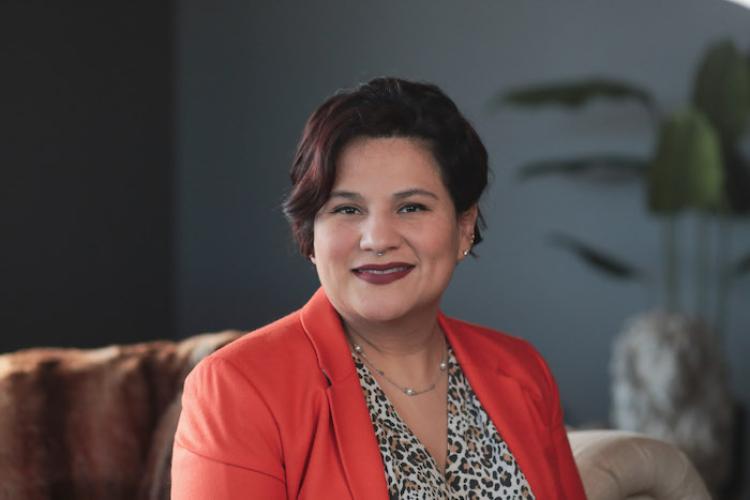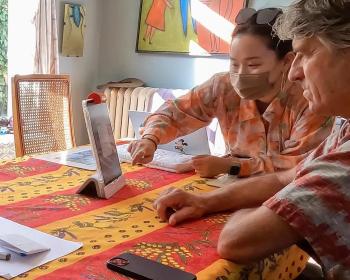By Juana Gallegos, UW School of Nursing Student & 2022 Queen Silvia Nursing Award Recipient
University of Washington Dementia & Palliative Education Network (UW DPEN) Update
As published on AlzWA blog
Living with the diagnosis of Alzheimer's disease is difficult not only for your loved one who is experiencing all these changes but for the family member who sees it all unfold. It’s hard seeing your loved one drift away as they lose parts of themselves. Especially if you are not there every day to remind them of who they are, or what they mean to you, something as simple as a gesture of reassurance that they are safe and loved.
Not only is it hard but it can be painful to know that they have moments of severe confusion where the people you have wholeheartedly entrusted to provide care for them may be unable to calm them. From my short-lived experience looking in, the vibrant lives these patients have lived does not go unnoticed. As an owner of an Adult Family Home in Washington State that specializes in patients living with dementia, my primary role is to be their caregiver in all aspects regarding their physical and mental well-being. Secondly, I am their voice when they can’t seem to muster the correct words, to be their calm when it seems like everything they know is upside down. In my almost two years of experience, we have had varying levels of patients living with Dementia reside in our home. Residents each have their own special characteristics and personalities that can bring a piece of a joyful memory when I think about them.
As a person who is a nurse with a minor in psychology, has kids, and was in the military, I can honestly say there is no training out there that prepares you for the intensity of caring for patients who are living with dementia. I say intensity in a manner not to be taken in a negative light but rather with the descriptor that residents living with dementia love intensely, feel intensely, and also become confused intensely. They have the good moments of pleasantly laughing while reminiscing about the past, like going to school, working, or friends they once had. With this also comes the moments of crying with confusion, repeating of wanting to go home since they don’t live there, to sometimes bouts of rage, feeling like they are being held captive against their own will.
All of these emotions can circle in a short amount of time, and that is typically okay. However, it is in the moments when I see my patients that cannot be redirected, distracted, or helped otherwise since they are confused beyond their normal that I want to find an attainable way to help them. A realistic, cost-effective, caring, and healthy way to assure people living with dementia in their times of most need, when they are extremely confused.
I kept circling back to my patients in the last two years who would all make a similar request: "Call my (insert loved one's name here) and let me talk to them," or "I know I don’t live here, or I don’t know you, but I want to speak to my son so he can explain why I am here and so forth." It always led back to wanting to speak to someone they knew and trusted. I put myself in their shoes, and I have to say I would do the same thing. Like a child asking their parents when they need reassurance that everything is going to be okay, it is our primary loving instinct to want to rely on those who we know care for us. I knew that if I could find a solution like that, I would not only be helping families and caregivers but, most importantly, patients.
That is how my idea came about that I received an award for, The Queen Silvia Nursing Award. This award is given to nurses who have an idea that seeks to improve the quality of life for those living with dementia. The focus has recently been to involve technology in the idea since we all know we rely on it now and will continue to do so. The idea is for a Smart Video Conferencing Application that helps de-escalate patients experiencing severe confusion related to dementia.
The idea focuses on creating an application that can be downloaded to a tablet or phone for easy access in times of need. The patient can then interact with an AI version of their family member that they know and trust to ask commonly asked questions, like where they live, if they take medications, and so on. This would allow the patient to get answers in a timely manner and to hopefully be assured that the care they are receiving is needed and they can focus on accepting the care. The caregivers can then be more focused on providing care for the patient, like medication administration, feeding, toileting, etc., since they are spending less time trying to de-escalate a patient.
This technology is never meant to replace personal touch or interactions. Just like Face Timing with a family member weekly, this does not replace their presence. It is merely a tool that is intended to provide reassurance and calm patients in severe distress so they can live in a more peaceful and reassuring environment.
AI is quickly morphing and creating capabilities in healthcare. I know from personal validations from other health providers that this tool would be a huge asset in providing safe, nurturing healthcare to those living with dementia. Now my next step in this process, after I meet the Queen in Sweden to receive the award, is to make this application come to life.
ABOUT THE AUTHOR
(From UW)
UW School of Nursing student Juana Gallegos has been selected as the second United States recipient of the UW Queen Silvia Nursing Award (UWQSNA) for dementia care.
Gallegos is a Master of Nursing student in the UW Tacoma School of Nursing & Healthcare Leadership. The Tacoma campus’s nursing degrees are accredited as part of the tri-campus UW School of Nursing.
Gallegos’s idea involves a smart video app that uses AI to interface with an individual living with dementia by learning trusted family members’ pre-recorded responses. Individuals living with dementia will be able to ask questions and receive immediate responses from their AI family members, which can contribute to increased feelings of assuredness about the care they receive.
“This progressive idea has incredible potential for harnessing the power of technology to reorient and enhance interactions between individuals living with dementia and their healthcare team and family members. Being able to hear voices from loved ones more frequently can provide familiarity and comfort for individuals living with dementia in an environment that can oftentimes be disorienting and anxiety-provoking.”” said Azita Emami, Executive Dean of the UW School of Nursing.
ABOUT THE AWARD
The QSNA was established by Swedish Care International in 2013 as a birthday gift for Her Majesty (HM) Queen Silvia in recognition of her long-term commitment and dedication to elderly care and the quality of nursing for people with dementia. The award featured innovative ideas and solutions to improve the quality of care for older adults and people living with dementia.
Last year was the first time the award was open to nursing students in the United States. The launch of the UWQSNA in the US in 2020 coincided with the World Health Organization’s celebration of the International Year of the Nurse and the Midwife in honor of the 200th anniversary of the birth of Florence Nightingale. Last year’s winning idea by Brooke Tamble involved developing an interactive app to address daily needs, memory loss, isolation from family, and the need for mental stimulation during the COVID-19 pandemic.







